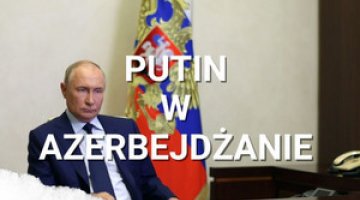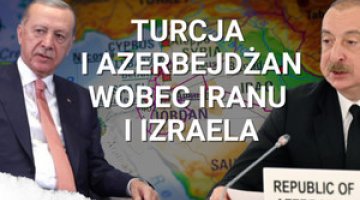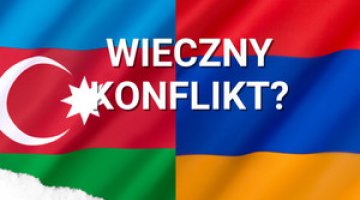Elections in Azerbaijan: petrification of the petro-republic
Signs of intensifying domestic tension have been seen during the year preceding the election, both among the general public and inside the ruling elite. Furthermore, Russian influence on the political situation in Azerbaijan, in both domestic and regional terms, has become more evident. In this context, the election is expected to strengthen the president’s power, protect the elite’s unity and ossify the country’s political system. Principally, this means that chances of any reforms (especially political) are limited and that Russian interests will be respected to a greater extent in the country’s policy.
Azerbaijan: the country of Aliyevs
Azerbaijan’s present political system and the principles of its domestic (authoritarian and oligarchic system) and foreign policies (maximisation of the financial and political profits drawn from oil and gas production) were created by the incumbent president’s father, Heydar, a key politician in Soviet Azerbaijan and president of independent Azerbaijan from 1993 until his death in 2003. His policy is continued by his son, who rules the country with the aid of the elite consisting of former aides of Heydar Aliyev, and respects their interests. The old guard, both formally and informally, controls the country’s key economic and security sectors. The election was preceded by the president’s attempt to weaken the old formation and to gain complete independence. The turning point of this attempt at the end of 2012 was the disclosure of a corruption scandal where Ramiz Mehdiyev, the head of the presidential administration played the central role (he also held this function under Heydar, and he is the key representative of the old elite). This attempt was unsuccessful partly due to emerging social tension in the election year (riots in Ismailli and protests in Baku at the beginning of this year). The significance of the law enforcement agencies, which are directly controlled by the old guard – given the social tension and especially the high likelihood of protests linked to the election – has strongly contributed to reconsolidation of the elite. The president’s capabilities and will to make any major changes in the government system, let alone political reforms, have visibly melted. He is running for presidency with the assumption of securing and buttressing the existing politico-economic system.
The opposition – the consolidation of weakness
The group on the other side of the barricade is the young and politically disorganised opposition (operating with the means of social networking) using liberal and democratic slogans. They are also backed by the old and socially marginalized opposition parties (Musavat and the Azerbaijani Popular Front Party). The two groups are co-operating with one another in the upcoming presidential election by backing their common candidate, Jamil Hasanli.
During the election year, these circles made attempts to become involved in grassroots public protests: for example, they added publicity to the Ismailli protests and other signs of public dissatisfaction via social networking sites. They were also hoping to capitalise on the tension within the elite and receive support from both the West and Russia. The access to the electronic media, raising socially sensitive issues and effectively putting its message across to foreign media are all proofs that the new opposition has potential for development. These elements are very likely to make attempts to get people on the streets after the election, which would mean confrontation with law enforcement agencies.
Hypothetically, the opposition could derive strength from intensifying public dissatisfaction in Azerbaijan, one sign of which has been this year’s protests. This dissatisfaction is caused by frustration resulting from the existing system of distributing vast incomes from oil exports (which the elite and Baku city benefit from), the government’s incompetence and blatant arrogance, and corruption. Also the strong Muslim factions (including those linked to the banned Islamic Party of Azerbaijan and Salafi movements) could temporarily provide a more extensive support base. However, even though social issues are linked to the system and are bound to aggravate over time, they are still unlikely to have an impact on the election itself. The opposition is institutionally weak and has no charismatic leader, and therefore is unable to capitalise on these issues politically. Public dissatisfaction is still targeted at the elite and not the president himself.
The factor that will ultimately affect the level of support for the opposition’s candidate (which is likely to be low) are actions the government will take: starting from the uncompetitive electoral law and control over the state administration, the media, etc. through legislative moves going as far as detentions and government-inspired violent acts against people linked to the opposition and control of the election process itself.
The Russian factor
In the context of this election, the Russian factor has been manifested most clearly in Baku’s policy in recent years. Russia became home to an organisation of Azerbaijani business and political elite (the so-called Billionaires’ Union) who could potentially oppose Aliyev and are linked to the young opposition in Azerbaijan. Furthermore, the opposition’s first candidate in the election, Rustam Ibragimbekov, is a Russian citizen (his candidacy was blocked by the Central Election Commission for procedural reasons). Thus Russia has gained a strong instrument of pressure to apply on Baku. The situation in the region is also developing to the detriment of Azerbaijan: the cooling of strategic relations with Georgia (after the Saakashvili team was defeated in the recent election), the US and Turkey’s evident reduction of interest in the Caucasus (in political terms), and, above all, Moscow’s success in playing on existing tensions between Azerbaijan and Armenia. This manifestation of Russian duress is forcing Azerbaijan to give more respect to Moscow’s interests. For example, Baku signed an agreement to enhance energy co-operation in August this year in response to this.
The consequences
The situation ahead of the election indicates that Azerbaijan’s political system is cemented in place: nothing poses a direct threat to Aliyev’s power and he does not appear to be interested in internal reforms (political and social). The election is likely to corroborate these trends and, as a consequence, political and social tensions are likely to be aggravated in the future.
The election process has made evident the misunderstandings and tensions existing in Azerbaijan’s relations with the West: Azerbaijan is interested in developing energy co-operation, but it is clearly unwilling to implement democratic standards (expressing this by rejecting criticism from the West). Relations would definitely worsen, if the government chooses to brutally suppress the potential protests linked to elections, which is quite a realistic scenario. This situation will adversely affect the atmosphere of the Eastern Partnership summit in Vilnius.
As the situation is developing in Azerbaijan – given the regional trends that are unfavourable for this country – Russia’s room for manoeuvre is expanding and its position is strengthening. From Baku’s point of view, Russia potentially has the strongest influence on the development of the situation in Azerbaijan, and its stronger position in the region offers it instruments which could put at stake Azerbaijan’s economic interests and security. All this has made Baku give more respect to Russian interests and avoid potential tension now and in the near future.
Cooperation: Krzysztof Strachota





